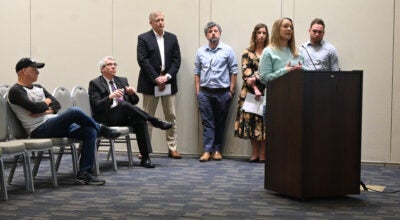City staff say Salisbury’s $800 historic landmark fee likely to be changed following concerns
Published 12:10 am Tuesday, November 30, 2021
By Natalie Anderson
natalie.anderson@salisburypost.com
SALISBURY — City staff say they’re likely to recommend a change in the $800 fee now charged for historic landmark applications following concern that the fee is too steep.
During a Historic Preservation Commission meeting earlier this month, members said they were surprised to learn about the implementation of an $800 fee for historic landmark applications, which Planning Director Hannah Jacobson says matches the fee for applying for a rezoning overlay. Jacobson said this is the first time a fee is being charged for such applications, but the process to establish a landmark is similar to that for rezoning in terms of property owner notification, posting signs and publishing notices in the newspaper.
When told at the Nov. 4 meeting that proceeds from the fee would be added to the city’s general fund, HPC Chair Andrew Walker said “that’s wrong.” HPC member Steve Cobb said it seemed to be a significant disincentive for people to apply and that he wasn’t sure what was being compensated if the money is returned to the city’s general fund.
Jacobson told the Post she doesn’t see the current fee as a disincentive because no one has called to express interest in an application. The lone, pending applicant is HPC member Eugene Goetz, who said he may consider withdrawing his application. Jacobson said his fee has been waived because his application was in progress when a moratorium was implemented earlier this year.
“Aside from (Goetz’s) house, we do not have any other landmark applications in the queue,” Jacobson said. “But I don’t believe that it’s the fee that is acting as a disincentive. We just haven’t had many calls expressing interest or requests for pre-applications.”
Still, Jacobson said she agrees “the fee is steep,” and will likely recommend a change in next year’s budget that’s based on cost recovery.
This summer, council members lifted a moratorium on designating historic structures as landmarks after approving changes made to the existing land development ordinance. The moratorium was a result of council members’ concern that the 50% property tax deferral accompanying the landmark status serving as the only incentive for the requests. Another concern whether certain neighborhoods were being overlooked that could benefit from the protection the status gives.
Mayor Karen Alexander and council members Brian Miller and David Post voted in favor of the moratorium. Council member Tamara Sheffield and Mayor Pro Tem Al Heggins voted against it. Sheffield and Heggins argued the vote was a “moot point” since city staff planned to address concerns with the ordinance anyway.
Council members approved changes to seek landmark designations in either the “property” or “cultural” categorization. The “property” categorization includes any building, structure, location, district or object that may or may not be listed on the National Register of Historic Places and is an “excellent example of historic resources and recognized for its architectural integrity.”
Meanwhile, “cultural” categorization includes structures that otherwise may not have been eligible but still speak to the cultural heritage of the city. Some properties that could fall into this category include schools, churches, art centers, theaters, entertainment halls, stores and businesses. Other eligible structures include those “able to provide physical records of experience among particular ethnic groups” and sites representative of or associated with particular social, ethnic or economic groups during a certain time period.
No mention of the fee was made during the city’s budget planning retreat this spring or prior to the vote to adopt the budget in June. Sheffield asked about the large increase for special projects in the Planning Department’s budget, which was for the Neighborhood and Downtown Revitalization program. Sheffield also asked residents to look at the proposed fee schedule included in the budget after voicing her opposition to a “ridiculous” charge to rent the Bell Tower Green Park.
Sheffield ultimately was the only council member to vote “no” on the budget for the proposed fee increases, a 2% increase in water and sewer prices and a $1.15 increase in residential curbside waste collection. Additionally, an 8-cent increase to stormwater fees was adopted to offset inflation and fund stormwater projects aimed at reducing flooding and pollution in compliance with the existing National Pollutant Discharge Elimination System permit.
Sheffield told the Post her copy of the budget includes “millions of sticky notes” where she pored through the budget with “tons of questions” about additional fees. She equates those fee increases with a tax hike, and said this is why council members must read the budget page-by-page to address all of those issues rather than pushing the budget through at the last minute.
She credited the work of City Manager Lane Bailey to change the budget planning process over the years, but she said there needs to be more ability to go more into detail about proposed budget changes prior to adoption. Sheffield said no one should be caught off-guard by the fee and, though it may be an appropriate charge, the problem is not knowing about it or discussing it.
“We need to be more detailed in our approach about how we review and finalize our budget,” Sheffield said. “That is our responsibility to re-evaluate these things each budget cycle.”
Alexander told the Post such fees come at the recommendation of city staff who know best what is required for such services and the amount of manpower needed. She credited city staff for always keeping an eye on what nearby communities are doing across the region, and that such fees aren’t a way to make money.
“It’s just part of what it costs to do business through our Planning Department,” Alexander said. “So I don’t really think it’s out of line.”
Post said he wasn’t aware that there was or wasn’t a fee, but he doesn’t think it’s excessive based on the work required for such applications and the quick return on investment after paying the property taxes for a standard home costing around $250,000, for example.
Contact reporter Natalie Anderson at 704-797-4246.





